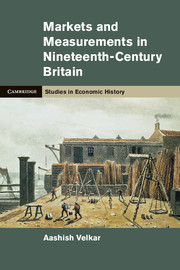
- Publisher:
- Cambridge University Press
- Online publication date:
- July 2012
- Print publication year:
- 2012
- Online ISBN:
- 9781139151030
- Subjects:
- History, Regional History after 1500, Economic History

Measurements are a central institutional component of markets and economic exchange. By the nineteenth century, the measurement system in Britain was desperately in need of revision: a multiplicity of measurement standards, proliferation of local or regional weights and measures, and a confusing array of measurement practices made everyday measurements unreliable. Aashish Velkar uncovers how metrology and economic logic alone failed to make 'measurements' reliable, and discusses the importance of localised practices in shaping trust in them. Markets and Measurements in Nineteenth-Century Britain steers away from the traditional explanations of measurement reliability based on the standardisation and centralisation of metrology; the focus is on changing measurement practices in local economic contexts. Detailed case studies from the industrial revolution suggest that such practices were path-dependent and 'anthropocentric'. Therefore, whilst standardised metrology may have improved precision, it was localised practices that determined the reliability and trustworthiness of measurements in economic contexts.
 Loading metrics...
Loading metrics...
* Views captured on Cambridge Core between #date#. This data will be updated every 24 hours.
Usage data cannot currently be displayed.